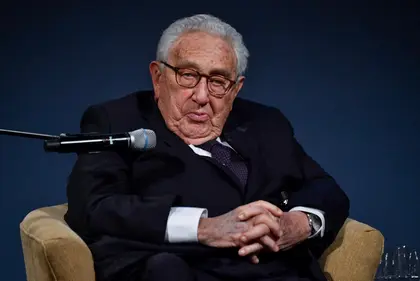US elder statesman Henry Kissinger said Tuesday, Jan. 17, that Russia’s invasion shows there is no longer a point to keeping Ukraine out of NATO, the long-held aspiration of Kyiv that he had opposed.
The 99-year-old former secretary of state and apostle of realpolitik has for months advocated a ceasefire in the Ukraine war that would in effect accept some military gains by Russia.
JOIN US ON TELEGRAM
Follow our coverage of the war on the @Kyivpost_official.
But speaking virtually to the World Economic Forum in Davos, Kissinger said that NATO membership for Ukraine would be an “appropriate outcome.”
“Before this war, I was opposed to membership of Ukraine in NATO because I feared that it would start exactly the process that we have seen now,” Kissinger said.
“Now that this process has reached this level, the idea of a neutral Ukraine under these conditions is no longer meaningful,” said Kissinger, speaking before a bookcase with a framed picture of president Richard Nixon, under whom he served.
Russian President Vladimir Putin had described Ukraine’s NATO aspirations as a threat as he justified the invasion launched on February 24 last year.
The United States had insisted that decisions on NATO were up to Ukraine. But the bid had little traction with European powers wary of granting the alliance’s mutual security guarantees to a nation that has already been in a low-intensity war with Russia since 2014.

Now It’s Time to Pull Together – Surely?
Kissinger, in an essay last month in the conservative British magazine The Spectator, warned that the Ukraine conflict had parallels to 1914 when major powers inadvertently escalated into world war.
He called for a ceasefire in which Russia withdraws to pre-invasion lines but not beyond, staying in eastern Ukraine as well as the Crimean peninsula, which Moscow annexed in 2014, with the territories open to later negotiations.
At Davos, Kissinger said it was important to “keep the war from becoming a war against Russia itself” and to “give Russia an opportunity to rejoin the international system.”
While acknowledging that countries once dominated by Moscow would be hesitant, Kissinger said it was critical to avoid instability in the vast nuclear-armed nation.
A diplomatic process could help Russia “re-evaluate its historic position, which was an amalgam of an attraction to the culture of Europe and a fear of domination by Europe.”
You can also highlight the text and press Ctrl + Enter










